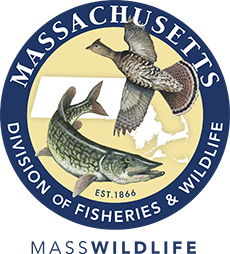- Division of Fisheries and Wildlife
Media Contact
Media Contact, MassWildlife

This winter, an avian flu known asHighly Pathogenic Avian Influenza (HPAI) was detected in domestic and wild birds in Massachusetts and elsewhere in the region. Positive cases are declining with the arrival of warmer temperatures.
Both wild and domesticated birds can become infected with HPAI. Raptors, waterfowl, and other aquatic birds are most at risk for infection, although any bird species should be considered susceptible. Birds may be infected with HPAI without showing any signs of illness.
Humans are rarely infected with avian influenza viruses. Humans that have prolonged close contact with sick or dead birds infected with HPAI are the most at risk of becoming infected. The virus is shed from infected birds through bodily fluids, most commonly saliva, mucous, and feces. Inhaling those shed particles or contacting them and then touching the eyes, nose, or mouth can allow the virus to pass to humans.
Safety tips for hunters
- Processing and cooking: Dress game birds in the field when possible. While eating wild game meat is generally considered safe, hunters can minimize risk from wildlife diseases by wearing gloves when dressing birds and washing hands with soap and water afterwards. Cook game meat to an internal temperature of 165°F to kill bacteria and viruses, including avian flu viruses. Click here for more information on best practices for processing and cooking wild game.
- Reporting and handling birds: Hunters should avoid handling any birds that appear sick or have been found dead. Report observations of sick or deceased birds if 5 or more birds are found at a single location using this simple form at mass.gov/reportbirds.
More information
People with questions about the public health impact of HPAI can visit DPH’s avian influenza webpage or call the Division of Epidemiology (available 24/7) at 617-983-6800.
Click here for more information about avian influenza from the CDC.
